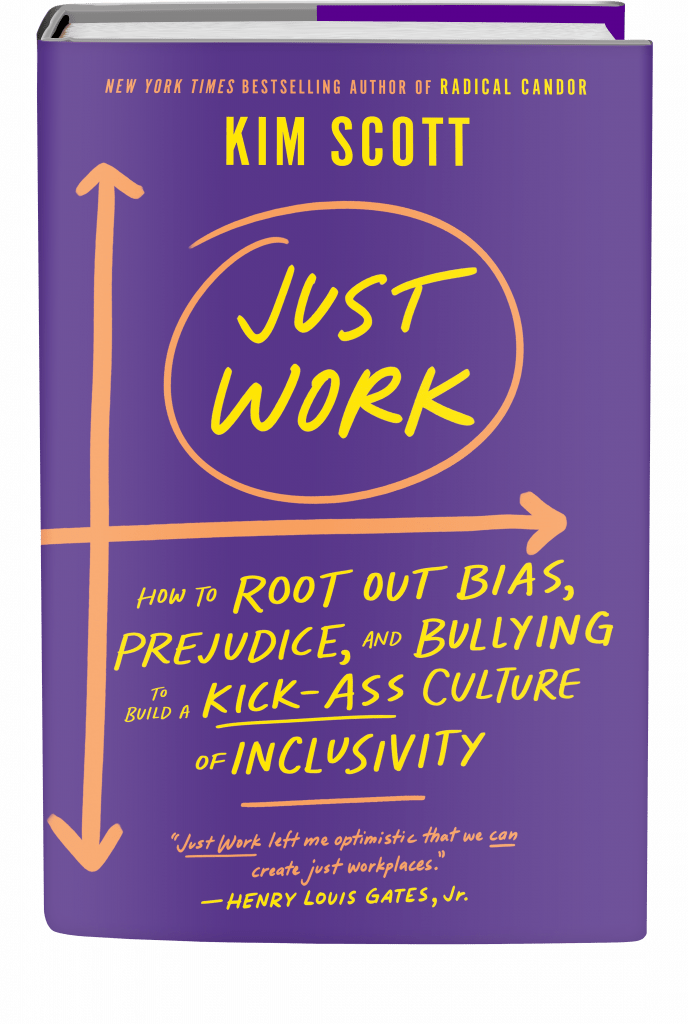Kim Scott is the author of Radical Candor: Be a Kick-Ass Boss Without Losing Your Humanity and Radical…
How to Practice Radical Candor In Remote and Hybrid Workplaces
I’ve spent more than a decade working in remote and hybrid environments. In fact, I have worked from home for so long that I don’t think I could even function or be productive in an office setting.
However, I realize for many people the opposite is true, and being suddenly thrust into remote work and hybrid office situations over the past several years has upended everything they thought they knew about how to communicate effectively at work.
This is especially true when it comes to giving feedback. At Radical Candor, a reader wrote in and expressed what many of you are probably thinking.
“A lot of advice you offer is face-to-face while walking back from a meeting. Any advice on how to apply some of the principles since we transitioned to working from home? I find that I have to schedule meetings to have those conversations and it’s not as effective.”
It’s true that we recommend you give feedback that is kind, clear, specific and sincere face-to-face or on video, but we also recognize that this is simply not possible for folks who are working together but no longer working side by side.
And, with data showing that most remote workers have no desire to return to pre-pandemic office culture, giving feedback to folks you don’t see every day is a necessary skill for everyone who manages or is part of a remote or hybrid team.
A working paper titled “The Power of Proximity to Coworkers” from economists at the Federal Reserve Bank of New York, the University of Iowa, and Harvard University posed the question:
If there is a permanent increase in remote work post-pandemic, can alternative management practices substitute for the decrease of coworkers’ online feedback and guidance?”
We think the answer is yes.
Listen: Practicing Radical Candor In Remote Workplaces >>
How to Reach Out to Remote Employees
This doesn’t mean practicing Radical Candor in remote and hybrid work environments has to be difficult, nor do you have to schedule every interaction with another team member.
It just means you have to change how you engage with one another (the Radical Candor team has always been fully remote).
Instead of walking back to your desk with someone after a meeting and having a two-minute conversation with them, you’re going to have to reach out and ask to have that quick chat.
I don’t know about you, but I hate to be called on the phone out of the blue.
Even though I spent the first half of my life talking on the phone as part of my social life and for my former career as a journalist, suddenly being called by my boss or a co-worker evokes a slight feeling of panic and it disrupts what I’m working on.
However, if my boss or a co-worker sends me a text or a Slack message and asks if I have a quick second, I am totally game.
Sending a text or chat and asking someone for a quick phone or video call is the remote or hybrid version of the impromptu two-minute feedback conversation.
In addition, this allows you to stay in frequent contact with people you work with who aren’t working in the same space as you, and it allows you to pick up on people’s most subtle emotional cues.
Radical Candor author and co-founder Kim Scott says:
“I learned this from my boss when I lived in Russia. He made a point of calling me every day from New York, if only for a three-minute check-in call. He had operations in Africa in the 1970s and had learned the importance of frequent communication to pick up on emotional cues from people in far-flung locations.”
If You’re the Boss Managing a Remote or Hybrid Team …
Remember that everyone is different, which is why you need to ask each member of your team what works for them. While some people may want to talk on the phone several times a day, others might find this disruptive and stressful.
Don’t assume that what works for one person will work for every person.
Sometimes replicating in-person activities remotely can work. If you both get a cup of tea, a video call can feel more human.
Take an extra moment to talk about something beautiful you saw or something funny you heard. You can also have a phone call where you both go for a walk.
This is where the Care Personally aspect of Radical Candor is crucial. Take time to nurture your relationships with each team member so you know how to engage with them effectively and vice versa.
Be a thought partner versus an absentee or micromanager. Remember, to be a true thought partner with each of your employees you need to be involved, listen with the intent to understand versus respond and ask relevant questions.
Only when you get to know your direct reports well enough to know why they care about their work, what they hope to get out of their careers, and where they are in the present moment in time, can you set them up to successfully work in a remote or hybrid environment.
Yes, this is emotionally taxing, and it’s an integral part of being a good boss. It’s what you signed up for when you decided to take a position as a manager.
If You’re an Individual Contributor Working Remotely …
For those who like to work with others, suddenly finding yourself isolated at home full-time can be overwhelmingly lonely. But, just because you’re working from home doesn’t mean you can’t collaborate.
Consider opening a remote co-working Zoom room. This allows people to log on and work with each other similar to how they would in an office.
You can turn off your video and go on mute then check in with the group every hour or so for a quick meditation or some group physical activity or just take a few minutes to talk.
If you’re feeling disconnected, talk to your manager (assuming you’re not working for a bad boss).
People have a lot of preconceived notions about bosses, which makes them intimidating to approach. It’s important to remember that most (unfortunately, not all) people don’t intentionally make decisions to make life more difficult.
When giving feedback to your boss, assume they were doing what they thought was the right thing. Starting with that kind of mindset puts you in a better position to deliver feedback to your boss.
By working together with your manager you can likely come up with a solution that will help you feel more engaged at work. And if you don’t, that’s OK, too. Working remotely is not for everyone.
According to research from Pew, 61% of workers choosing to return to the office cite feeling more productive at their workplace as a major reason.
If you want to get back to the office there are plenty of companies who’d love to have you. You spend an incredible amount of time working — make sure that time is well spent and that you choose an option that works best for you.
Get more work-from-home tips on the Radical Candor podcast. If you’re feeling isolated from peers, consider getting a mentor or a coach or joining a networking group.
————————————————————————————————————————————————————————————–
*This post was updated April 3, 2023
- Take the Radical Candor quiz >>
- Sign up for our Radical Candor email newsletter >>
- Listen to the Radical Candor podcast >>
- Shop the Radical Candor store >>
- Get Radical Candor coaching and consulting for your team >>
- Get Radical Candor coaching and consulting for your company >>
Need help practicing Radical Candor? Then you need The Feedback Loop (think Groundhog Day meets The Office), a 5-episode workplace comedy series starring David Alan Grier that brings to life Radical Candor’s simple framework for navigating candid conversations.
You’ll get an hour of hilarious content about a team whose feedback fails are costing them business; improv-inspired exercises to teach everyone the skills they need to work better together, and after-episode action plans you can put into practice immediately to up your helpful feedback EQ.
We’re offering Radical Candor readers 10% off the self-paced e-course. Follow this link and enter the promo code FEEDBACK at checkout.





